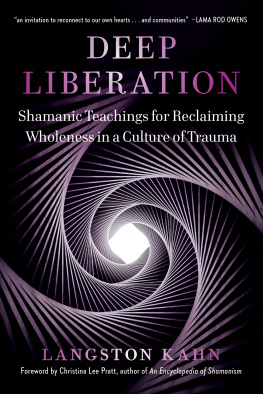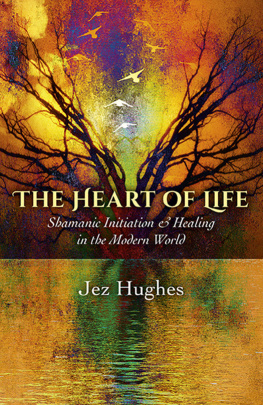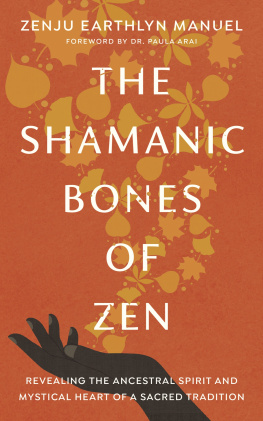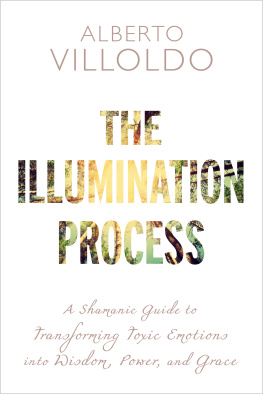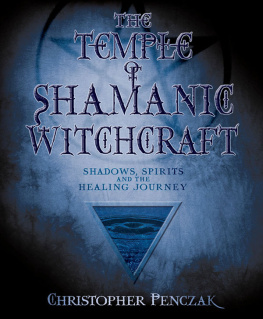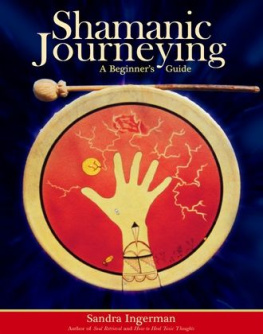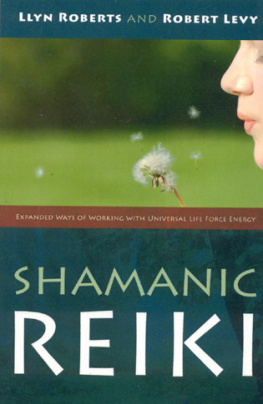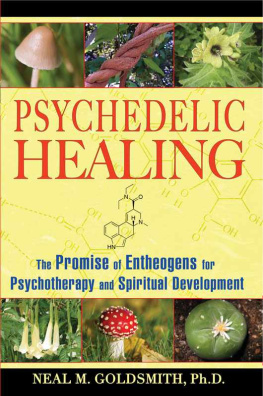
Praise for Deep Liberation
In Deep Liberation, Langston Kahn offers powerful practices to tend to our deepest hurts as we attempt to be human in a world that so often wants us to be other than human. He expresses his practice as well as his heart as an invitation for us to reconnect to our own hearts as well as to our souls, passions, and our communities. This book is a special gift to those of us wanting to experience liberation through our healing.
Lama Rod Owens, author of Love and Rage: The Path of Liberation through Anger
With Deep Liberation, Langston Kahn invites us into depth, healing, and truth with a gentle, confident hand. Reading this text, I kept thinking it was an answer to the question Toni Cade Bambara asked us: Are you ready to be well? Every part of the book is clearly sourced from Kahns own experience, traced back to his teachers, guides and mentorswho run the gamut of race, class, ability, methodology, gender, sexuality, and spiritual lineage. We get to see how the legacy of shamanism is woven throughout the human experience. Here, that sacred calling is made accessible to all who are willing to listen for it within themselves. The practices are laid out clearly as a path toward a true authenticity with self and the living world. This book is easy to read, but the work within is hard enough to warrant a lifetime of practice.
adrienne maree brown, author of Pleasure Activism: The Politics of Feeling Good
Deep Liberation opens with a familiar cackle: Kahn reminisces on the naivet of television-bound American politicians during the financial collapse of 2008 and remembers laughing at their presumptuous optimism and groundless gusto. His laughter is of the species I may have heard before while seated at the feet of Yoruba shamans in my own country, Nigeria: the emancipatory mockery of the shaman who knows that the world has ended many times before, who knows the inadequacies of secularism and rational puritanism in addressing the critical challenges of our time, and who knows there are wisdoms and orifices and channels and worlds we must contend with in our struggles for the otherwise. Throughout this book, the echoes of that knowing guffaw steal through the pages as Kahn deftly hoists a calabash of Indigenous healing wisdoms and spiritualities and alchemizes a princely recipe of exercises, practices, and rituals to concretize his expansive thesis of somatic transformation, to address trauma, and to equip those who linger in the wake of world-endings for the work we must do in the world yawning to wake. This is a wealthy tome of de-colonial strategies. Read it because it begins with shamanic laughter, the first phrase of a serious take on things. Read it, and soon youll be in on the cosmic joke too.
Bayo Akomolafe, PhD, author of These Wilds Beyond our Fences: Letters to My Daughter on Humanitys Search for Home
This book couldnt have come at a better time. An essential guide rooted in insight, history, and occulted knowledge, Deep Liberation provides practical steps we can take to address our wounds, connect with our ancestors, and better work together to care for each other and our planet as we reshape our world. Langston Kahns work helps us navigate these crucial sociopolitical times as we learn to become fully engaged adult human beings so that we may dance together, facilitating radical transformation and liberation. This view of wellness is a breath of fresh air in a society constricted by the Western mainstream medical model. I recommended this book for psychologists, scholars, and activists who wish to engage with a worldview that is at once deeply resonant, ancient, progressive, and wise.
Vanessa Sinclair, PsyD, psychoanalyst and author of Scansion in Psychoanalysis and Art: The Cut in Creation
This is an accessible toolkit for undoing the psychic and emotional damage that limits our possibilities for experiencing true wellness and can shape how and to what degree we can express our souls purpose. Kahn teaches solid energy systems work focused on healing, grounding, and what I call self-blessing. The book features extensive visualization practices, including work on exploring and repairing the psychic and emotional body and developing healthy boundaries. Deep Liberation is a solid, potent collection of exercises and practices that build intelligently on each other and work together synergistically toward a singular goal: total psychic well-being. Highly recommended.
Aidan Wachter, author of Six Ways: Approaches & Entries for Practical Magic
Where many practices offer tools for soul literacy, in Deep Liberation Langston Kahn offers the full kit. Gently presented and thoroughly developed, the soul education in this book is not just the one all soul tenders should have access to; its taught with the compassionate authority we all crave.
S. Kelly Harrell, author of Gift of the Dreamtime: Awakening to the Divinity of Trauma
In the contemporary Western world, where there are extremely few traditional shamans, there is a great need for individuals to develop spiritual techniques that not only maintain our own spiritual hygiene, but also heal and guide our souls to higher purpose. Drawing from his own practices, Langston Kahn has compiled a comprehensive methodology, honoring techniques from various Indigenous communities around the world, which help to uncover and heal generational and childhood trauma through transformation. These processes have become ever more critical as modern societies become more materialist and neglectful of our relationship with the land, our ancestors, and the spirit world overall. I commend Langston for translating his own experiences and life stories into a roadmap that helps to not only liberate our own individual souls from the traumas that hold us hostage, but also to mend the balance we have with our communities and spirits.
David Shi, author of North Asian Magic: Spellcraft from Manchuria, Mongolia, and Siberia
As an enrolled Cherokee, longtime shaman, and medicine teacher in the Lakota tradition, I found Kahns approach very interesting: different, but of the same essence. I have never read a book dealing with anything shamanistic that approaches the depth here. Deep Liberation is beautifully written and researched. Kahn thoroughly knows the field. Each teaching is followed by an exercise so that the reader can integrate and use the information. This is an important text for seekers who want to develop their innate shamanic abilities to free their past, present, and future lives.
Grandfather Duncan Sings-Alone, author of Sprinting Backwards to God
Deep Liberation is a deeply humble, bold, and grounded approach to liberation work through shamanic practice that, perhaps most refreshingly, is treated as central rather than periphery to aligned being. Under the crush of a global sociopolitical reckoningand against the backdrop of a growing capital-infused trauma industry with little regard for cultural and racial histories and Indigenous practicesLangston Kahn locates the importance of psychic and material ancestrality in the service of collective healing and, ultimately, communal liberation. This book is a must-read for anyone interested in the depth of a guided nonlinear healing process with deference to textured identity and kin.
Lara Sheehi, PsyD, faculty at the George Washington University Professional Psychology Program
A powerful manual that embraces the head, heart, and body. Kahn knows what hes talking about in the context of history, but more importantly in the context of the experience, embodying the realization and not simply the knowledge.
Next page
